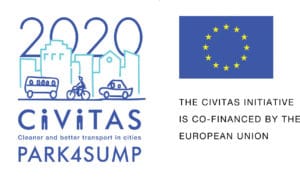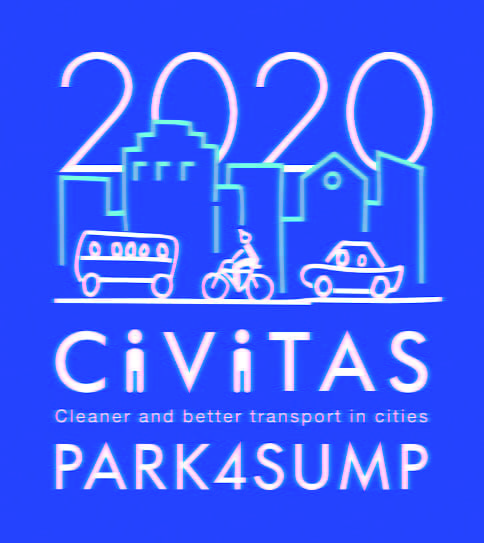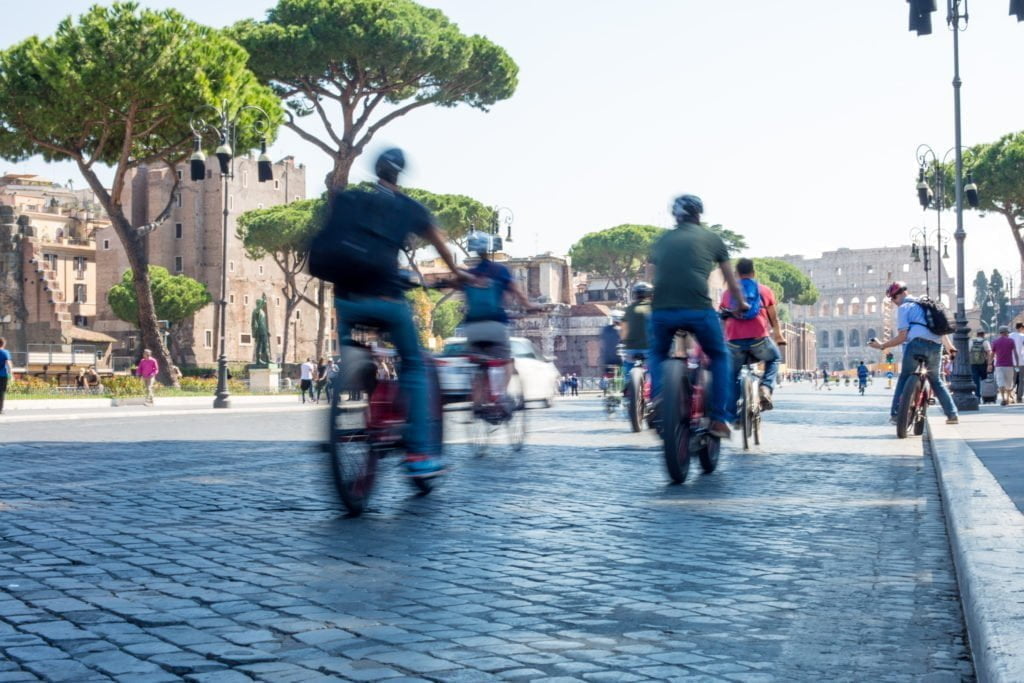Second POLIS-EPA webinar: Off-street parking management
Following an incredibly successful kick-off event, the POLIS-EPA dream team returned for the second instalment of the joint webinar series.
You can watch the recording of the webinar here. Please find all PPTs in the documents section at the end of this report.
One thing is for sure- parking is not what it once was; the integration of shared mobility, charging points and logistics functions is rapidly changing the face of the sector. We travelled from Rome to Freiburg, Stuttgart to Madrid, exploring how parking is driving the sustainable mobility transition.
On 9 December, speakers from across the parking sector convened to discuss off-street parking management activities for new mobility services, showcasing the Park4SUMP guidelines and a selection of integrated parking and service solutions.
It was a chance to discover how traditional car parking facilities are being upgraded to “Urban Hubs” incorporating electrification and shared mobility, the financial models supporting this, and the configuration of public-private partnerships.
“Our collaboration with POLIS is over 10 years old, and together we are exploring the rapidly changing face of parking, as it becomes an avenue for supporting multimodal travel,” said Nigel Williams, Vice President of the EPA.
Park4SUMP
The Horizon 2020 project Park4SUMP aims to place parking management as part of a wider strategy that can benefit urban mobility but also the overall quality of life of our cities. In fact, good parking management can help freeing up public space, supporting local businesses, reducing search travel, generating revenues, and making our cities more attractive.
Across 16 cities the project is deploying a range of new and innovative parking solutions. From cycle parking in Rotterdam, to “one-minute city” designs in Sweden, the project aims to:
- Uplift Parking management from an operational task to a strategic one
- Use innovative parking management as a backbone of the SUMP
- Raise awareness and develop an action plan in a co-creation process by including all relevant players from the outset
 The project has now released guidelines for integrating off-street vehicle parking trends.
The project has now released guidelines for integrating off-street vehicle parking trends.
“Improved urban parking policy is essential if we are to make our cities more sustainable and support the democratization of public space,” Said Park4SUMP coordinator, Laurens Vander Kuylen from Mobiel 21.
Park4SUMP has also been working at the European level to push for the elevation of parking management up the urban mobility agenda, bringing the service sector, local authorities and citizens together.
We heard from one example in the City of Freiburg. The German city is home to 230.000 residents and 30.000 students and is growing rapidly. Despite the cities extensive efforts towards sustainable mobility, the number of cars is also expanding.
Freiburg is now embarking on a set of innovative parking concepts to confront and manage these trends, including:
- Establish residential zones (with different level of car dependency)
- Set standard for car parking (inner city low numbers, outside higher numbers)
- Set standard for bicycle parking
- Set measurements for supplementing mobility concept (sharing services etc.)
“We now have an opportunity to experiment with new parking strategies,” said Peter Schick, City of Freiburg
This is being trialled in new inner city and peri-urban developments including the districts of Kleineschholz and Dietenbach, where car sharing, bicycle rental and cargo bikes are being integrated into the parking offer.
A practical insight into the parking sector today
So, carparking is going through a transition, but how do we go about transforming existing parking spaces into shared mobility hubs?
João Caetano Dias, Business Director at Empark, joined the webinar to provide practical insight into how the car parks of the future can be created, reflecting on the role of cities and the service sector.
“Many of our European cities have underground and multistorey carparks, yet space is so valuable, we must use these in more flexible and practical ways,” said Dias.
Empark is now developing mobility hubs by integrating car sharing, scooter and bike sharing and recharging facilities in existing parking spaces. In Madrid’s Plaza Colón, there are now 30 charging points as well as 7 Mobility Players- a concept which is being expanded to Barcelona and Bilboa.
However, cities and the parking sector must work together to foster a viable business case for this.
“If cities continue to offer free or low cost on-street parking, such mobility hubs will not fulfill their potential, we must create the economic models which incentivize new parking offerings,” asserted Dias.

Image credit: Brydon McCluskey/ unsplash
Electrifying the car park
Accommodating electromobility is a key challenge for the parking sector and cities. By 2030, 30% of cars sold will be BEV. As the electrification of vehicles grows, parking services must be able to keep pace with these trends if it is to support Europe’s transition away from combustion vehicles.
“We have to adapt our assets to accommodate this EV wave, easing access to reliable charging, while creating an appropriate pricing structure,” said Olivier Challe, Head of EV Charging Strategy at Indigo.
Challe outlined how off-street parking must adapt to offer ‘park and charge’ services. Indeed, Indigo is developing a monthly subscription tariff to streamline usage, as well as fast-charging hubs in the city centre to accommodate taxis and logistics vehicles.
Yet, as Challe warned, success also relies on effective data management, ensuring standardisation across the sector- an issue which is a concern across the mobility sector for public-private cooperation.

Image credit: michael-fousert/ unsplash
Integrating the parking sector: combining parking and transport hubs
Improving parking offers at transport hubs such as train stations and airports is critical to seamless transit. However, to achieve this goal improvements integrating the mobility system are often required in many transport hubs.
Rome-Fiumicino Airport has transformed its parking offer, integrating on -and off- street and multilevel parking into a digital access-controlled service management mobility model.
Where previously, vehicles had free roam over the airport’s parking facilities and road network, the new model separates and controls transit allowing only public vehicles adjacent to the terminal and permitting private cars on a parallel route controlling the stay over time.
The framework is managed through a digital control centre, overseeing an access, permit and payment system. This was also relayed to users through a comprehensive communication campaign.
This management model could be particularly suitable for integrated traffic and mobility schemes in small and medium sized urban centres combining UVARS and parking with accessibility, congestion and urban quality strategies.
“The new system brought order to the parking offering, streamlining traffic flow,” said Fraccari.
Parking in train stations is also being improved to enhance access. In Germany DB BahnPark is developing parking facilities which are central transfer hubs for various transport services or forms of mobility form large, medium and small sized cities.
“We are supporting all efforts to make sustainable mobility strategies successful, by reducing car parking spaces and making space for car sharing, bike parking and other more environmentally friendly options,” said Torsten Sprengel, CEO of DB BahnPark.
“This enables us to cater for more customers, thus increasing the number of passengers able to access the train station, without major infrastructural expansions.”
Indeed, the Stuttgart-Vaihingen station (opened just a few weeks ago) offers e-scooters, bike hire and car sharing- not your traditional carpark!
20th EPA International Parking Congress in Brussels
The 2022 Congress will be taking place from the 12-14 September. The theme is “The EU Green Deal and the Future of Parking – Integrated solutions for Dynamic Urban Management”.
Mr Roland Cracco, the President of the Belgian Parking Association, outlined the program and the multiple state of the art themes that will be presented at the 20th EPA Interntional Congress in Brussels.
Their past events have attracted over 500 delegates- operators in the parking industry, national and local public administrations, representatives of European Commissions and Projects, experts in the field of mobility, urban logistics, electrical mobility, the data world, ITS, Apps and more.
The Belgian Parking Association that is hosting the CO2 free event is looking forward to welcoming all and thanks Polis and Park4Sump for its support.
More information here.
Want to know more?
About the webinar series:
POLIS and the EPA work closely together, particularly on Park4SUMP, a European project which brings together 16 cities, working on new methods for parking and integrating parking within sustainable urban mobility policies. You can watch the recording of the webinar here.
POLIS Parking working group
The webinar follows activity conducted in the POLIS’ Parking Working Group, which facilitates coordination between authorities and professionals in charge of parking policy, on-street and off-street, public and private, and urban planning.
About Park4SUMP
The Horizon 2020 project Park4SUMP considers parking management as part of a wider strategy that can benefit urban mobility but also the overall quality of life of our cities. The project is stimulating further innovation in parking management and turning parking policies from being reactive and operational as today to become more strategic, effective and holistic.





